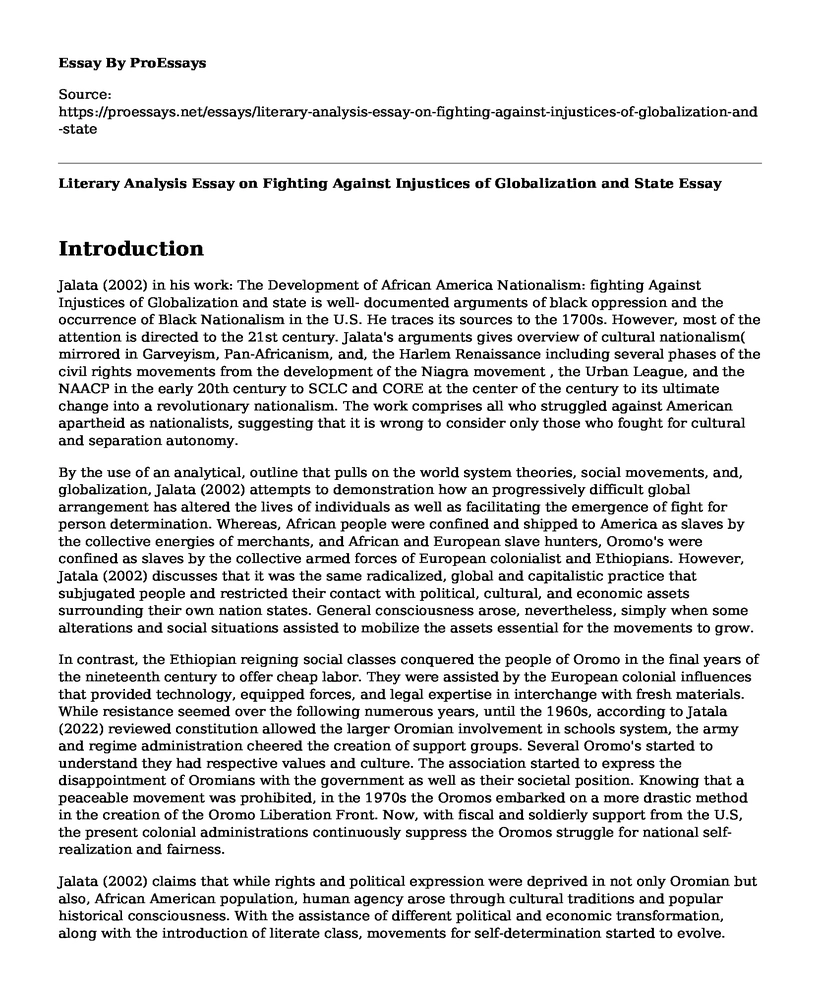Introduction
Jalata (2002) in his work: The Development of African America Nationalism: fighting Against Injustices of Globalization and state is well- documented arguments of black oppression and the occurrence of Black Nationalism in the U.S. He traces its sources to the 1700s. However, most of the attention is directed to the 21st century. Jalata's arguments gives overview of cultural nationalism( mirrored in Garveyism, Pan-Africanism, and, the Harlem Renaissance including several phases of the civil rights movements from the development of the Niagra movement , the Urban League, and the NAACP in the early 20th century to SCLC and CORE at the center of the century to its ultimate change into a revolutionary nationalism. The work comprises all who struggled against American apartheid as nationalists, suggesting that it is wrong to consider only those who fought for cultural and separation autonomy.
By the use of an analytical, outline that pulls on the world system theories, social movements, and, globalization, Jalata (2002) attempts to demonstration how an progressively difficult global arrangement has altered the lives of individuals as well as facilitating the emergence of fight for person determination. Whereas, African people were confined and shipped to America as slaves by the collective energies of merchants, and African and European slave hunters, Oromo's were confined as slaves by the collective armed forces of European colonialist and Ethiopians. However, Jatala (2002) discusses that it was the same radicalized, global and capitalistic practice that subjugated people and restricted their contact with political, cultural, and economic assets surrounding their own nation states. General consciousness arose, nevertheless, simply when some alterations and social situations assisted to mobilize the assets essential for the movements to grow.
In contrast, the Ethiopian reigning social classes conquered the people of Oromo in the final years of the nineteenth century to offer cheap labor. They were assisted by the European colonial influences that provided technology, equipped forces, and legal expertise in interchange with fresh materials. While resistance seemed over the following numerous years, until the 1960s, according to Jatala (2022) reviewed constitution allowed the larger Oromian involvement in schools system, the army and regime administration cheered the creation of support groups. Several Oromo's started to understand they had respective values and culture. The association started to express the disappointment of Oromians with the government as well as their societal position. Knowing that a peaceable movement was prohibited, in the 1970s the Oromos embarked on a more drastic method in the creation of the Oromo Liberation Front. Now, with fiscal and soldierly support from the U.S, the present colonial administrations continuously suppress the Oromos struggle for national self-realization and fairness.
Jalata (2002) claims that while rights and political expression were deprived in not only Oromian but also, African American population, human agency arose through cultural traditions and popular historical consciousness. With the assistance of different political and economic transformation, along with the introduction of literate class, movements for self-determination started to evolve. They acted so, nonetheless, in rather distinct social and political surroundings. While Africans in America lost several of their former social bond and linkages, they were permitted to have discrete economic, religious, cultural, and educational institutions, which laid the basis for African American nationalism.
Reference
Jalata, A. (2002). Fighting against the injustice of the state and globalization: Comparing the African American and Oromo movements. Springer. Retrieved from: https://www.biblio.com/fighting-against-the-injustice-by-jalata-asafa/work/604910
Cite this page
Literary Analysis Essay on Fighting Against Injustices of Globalization and State. (2022, Dec 16). Retrieved from https://proessays.net/essays/literary-analysis-essay-on-fighting-against-injustices-of-globalization-and-state
If you are the original author of this essay and no longer wish to have it published on the ProEssays website, please click below to request its removal:
- The Poem in the Park Essay
- Use of Figurative Language in The Great Gatsby: Critical Essay
- Love's Power: Romeo and Juliet Essay
- My Life as a Writer - Essay Sample
- Article Review on Bench Mark for Cultural Competence
- Essay Sample on Mary Shelley's Frankenstein: Revealing the Injustice of Women
- 1984: Government Control, Rebellion, and Human Nature - Book Analysis Essay







